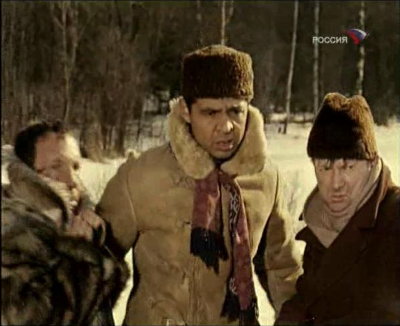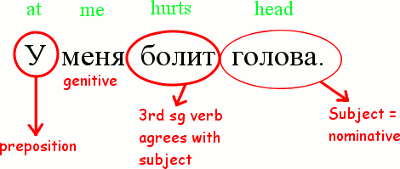На (часть первая)
The first meaning of the preposition на is “on.” In this meaning it is complemented by the prepositional case.
| Книга на столе. | The book is on the table. |
| Я забыл свой бумажник на полке. | I left my wallet on the shelf. |
| Вова спокойно наблюдал, как комар на его руке пил его кровь. Он удивился, что не больно. | Vladimir quietly observed the mosquito on his hand drink his blood. He was surprised that it didn't hurt. |
| На крыше больницы стоит вертолёт, готовый к спасению жертв несчастных случаев. | On the roof of the hospital there is a helicopter ready to rescue accident victims. |
Дублёнка
One of the most important and valued items in a Russian’s wardrobe has been the warm, soft and heavy sheepskin/lambskin coat known simply as дублёнка. Russians have always prized this particular garment very highly because it can keep one cozy on cold Russian nights, when the icy, piercing northern winds raise sweeping blizzards. And more importantly... because it costs some serious rubles. But fortunately, once you buy a quality дублёнка, whether it’s out of basic sheepskin, lambskin or the lavish shearling, it can serve you for half a lifetime. When I think of a дублёнка, the first thing that came to my mind is my grandfather’s old, rugged sheepskin coat that he has had since the early seventies and still wears today when out in the snowy countryside. Overall, sheepskin coats remain quite popular with men and women alike.
| Sg | Pl | |
| Nom | дублёнка | дублёнки |
| Acc | дублёнку | дублёнки |
| Gen | дублёнки | дублёнок |
| Pre | дублёнке | дублёнках |
| Dat | дублёнке | дублёнкам |
| Ins | дублёнкой | дублёнками |

Image from img11.nnm.ru
A hefty дублёнка worn by Vasily Alibabayevich, a character from the famous Russian comedy "Gentlemen of Fortune."
Here are some example sentences with the word:
| Cкоро зима, нам надо будет достать твою дублёнку. | Winter is coming, we’ll need to take out your sheepskin coat. |
| Любая хорошая дублёнка может стоить очень дорого. | Any quality sheepskin coat can cost a lot of money. |
| Hикита, сейчас же лето, зачем ты вышел на улицу в своей огромной дублёнке? | Nikita, it’s summertime. Why did you go outside in your huge sheepskin coat? |
| Cледователь сказал, что подозреваемый забыл свою коричневую дублёнку на месте преступления. | The investigator said that the suspect forgot his brown sheepskin coat at the crime scene. |
Болеть (hurt, ache)
Russian has a verb болеть which means “to hurt, ache,” and another verb болеть which means “to be ill.” That's right: their infinitives are spelled exactly the same, although they are conjugated differently. Today we will discuss the former.
The first thing to notice about the verb “to hurt, ache” is that it is only used in the third person, never in the first or second:
| to hurt, ache | ||
| Imperfective | Perfective | |
| Infinitive | болеть | заболеть |
| Past | болел болела болело болели |
заболел заболела заболело заболели |
| Present | - - болит - - болят |
No such thing as perfective present in Russian. |
| Future |
буду болеть будешь болеть будет болеть будем болеть будете болеть будут болеть |
- - заболит - - заболят |
| Imperative | Not used | |
In English we say, “My head hurts.” The Russians phrase it as “at me hurts the head”:

There are а couple things to note here. First of all, the person experiencing the pain shows up in the genitive case as the object of the preposition у. The body part that hurts shows up in the nominative case. Since the body part is the subject, the verb has to agree with it, not with the person who is suffering. If more than one thing hurts, the verb goes in the plural. Thus:
| У Виктора болит голова. | Victor's head hurts. |
| У Виктора болела голова. | Victor's head hurt. |
| У Виктора болят ноги. | Victor's legs hurt. present |
| У Виктора болели ноги. | Victor's legs hurt. past |
The prefix за- often adds the idea of “start to” to a verb, and the perfective заболеть is not an exception. Here are some examples.
| Через час после прививки у Вани заболела рука. | An hour after the vaccination Johnny's arm began to hurt. |
| Не пей воду из-под крана, а то у тебя заболит живот. | Don't drink tap water, or you will get a stomach ache. |
| — Блин, почему у меня всегда болят ноги? | “Dang, why do my feet always hurt?” |
| — Это потому, что ты всегда носишь модные туфли, которые вредят ногам. Тебе надо воспользоваться здравым смыслом и подобрать лучшую обувь. | “That's because you always wear fashionable shoes that damage your feet. You need to use common sense and buy better footware.” |
| — Что ты! Здравый смысл — это скучно. Ты знаешь, что всегда предпочитаю моду здравому смыслу. | “Oh, come on. Common sense is boring. You know that I always prefer style to common sense.” |
| — Да, это с твоей стороны нравственный недостаток. | “Yes, that's a moral defect on your part.” |
Гоголь-моголь
Some words always bring a smile to my face, like higgledy-piggledy, hurlyburly, hullabaloo, and floccinaucinihilipilification. Now I have a new one from Russian: гоголь-моголь.
| Гоголь-моголь is a dish made of raw egg yolks beaten with sugar. If your daughter has a sore throat and doesn't like to take medicine, then you feed her гоголь-моголь and soon everything will will be better. |  Photo courtesy of Wikipedia |
| Самый простой рецепт: взбить пару желтков яиц с сахаром и принимать натощак по утрам по две чайные ложки. (source) | The simplest recipe: beat a couple of egg yolks with sugar. Take two teaspoons in the morning on an empty stomach. |
Even Doctor Aibolit, the Russian equivalent of Doctor Doolittle, treated his animals with it:
| И к полосатым Бежит он тигрятам. И к бедным горбатым Больным верблюжатам, И каждого гоголем, Каждого моголем, Гоголем-моголем, Гоголем-моголем, Гоголем-моголем потчует. |
And he runs to the striped tiger cubs And to the poor, sick, Hump-backed camel cubs And he offers each gogol And he offers each mogol Gogol-mogol Gogol-mogol He treats them to gogol-mogol |
Гоголь-моголь is considered a cultured and refined dessert, worthy of being served in aristocratic homes. It may be flavored with chocolate or vanilla or coffee, made with fruit juices or pureed fruit, or even served in bars as a cocktail.
Это (часть вторая)
One interesting and very common use of unchanging это is to refer to a situation broadly. Consider this sentence:
| Я всю ночь не спал из-за шума. Это опять были наши соседи. | I didn't sleep all night because of the noise. It was our neighbors again. |
Although «Это были наши соседи» and “It was our neighbors” resemble each other superficially, they are grammatically quite different. In the English sentence “it” is the subject, singular “was” agrees with “it”, and “neighbors” is a predicate noun in the plural. In the Russian sentence соседи is the subject and induces verbal agreement. Notice that это does not agree in gender with anything in the sentence that precedes it. It's not referring to the night. It's not referring to the noise or the neighbors. It refers to the whole, abstract situation. Here are a couple other examples.
| Сегодня в два часа ночи в дверь постучали. Это была моя сестра. | At two o'clock in the morning there was a knock at the door. It was my sister. |
| Зимой 1970-ого года я жил в Норильске. Это был ад. Собачий холод, шесть недель совсем не было солнца, и даже местный самогон не мог облегчить нашу скуку. | In the winter of 1970 I lived in Norilsk. It was hell. It was miserably cold. For six weeks there was no sun at all, and not even the local homebrew could relieve our boredom. |
This use of unchanging это is not limited to “be” sentences. For instance, in Crime and Punishment Raskolnikov confesses with this phrase:
| Это я убил старуху.¹ | It was I who killed the old woman. |
This use is a bit different than the one we discussed earlier because instead of referring to a whole abstract situation, это serves to direct the listener's focus on the identity of one particular person in the situation:
| Когда мы были детьми, это папа покупал продукты, а не мама. | When we were kids, it was Dad who did the shopping, not Mom. |
| Это брат просит картинки показать, а не я. | It's my brother who is asking you to show us the pictures, not me. |
¹ The precise quote is «Это я убил тогда старуху-чиновницу и сестру ее Лизавету топором и ограбил.» “It was I who killed the old woman and her sister Elizabeth with an axe and robbed them.”
<< 1 ... 89 90 91 ...92 ...93 94 95 ...96 ...97 98 99 ... 158 >>